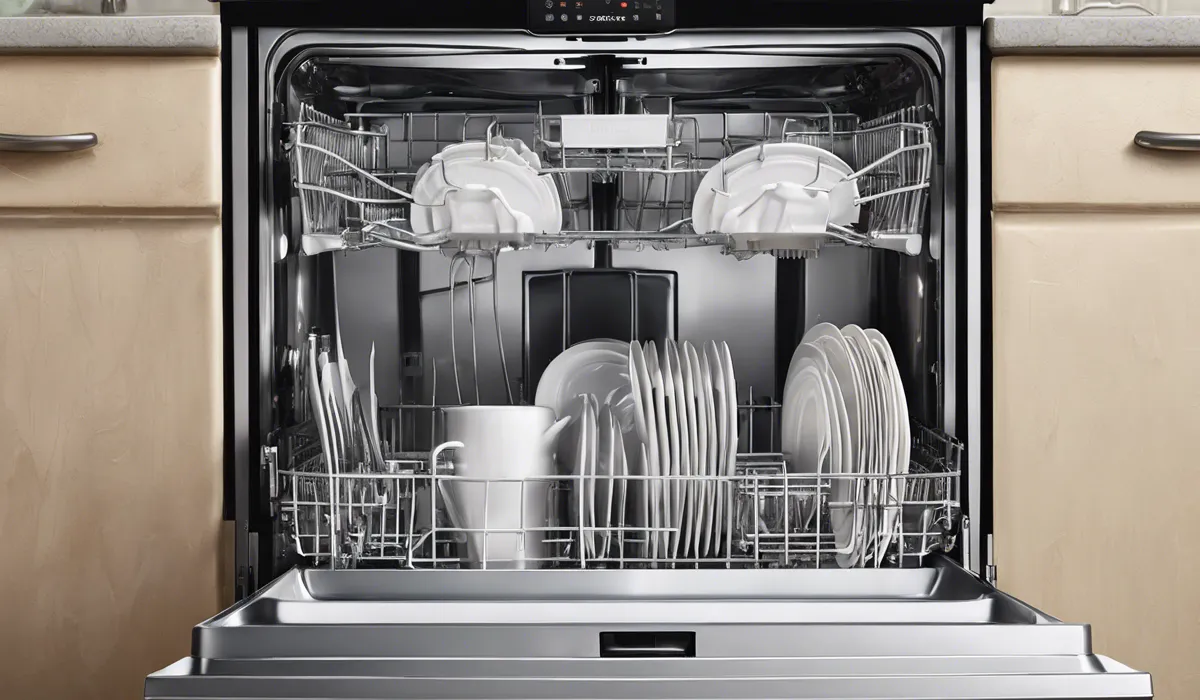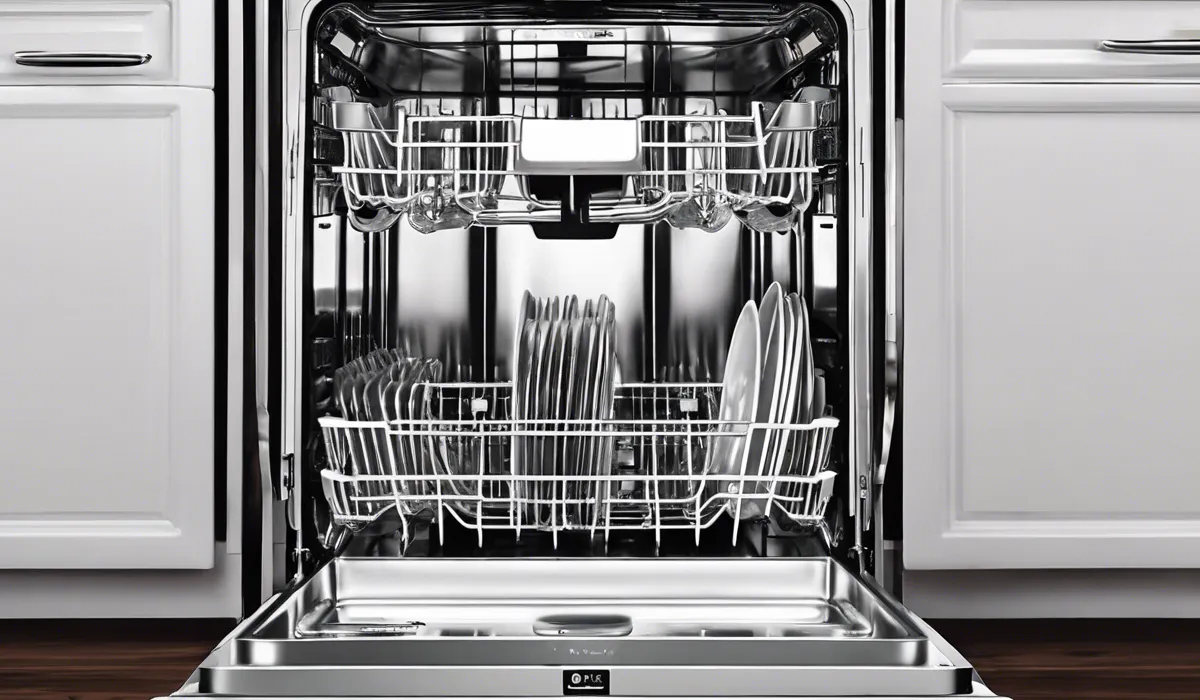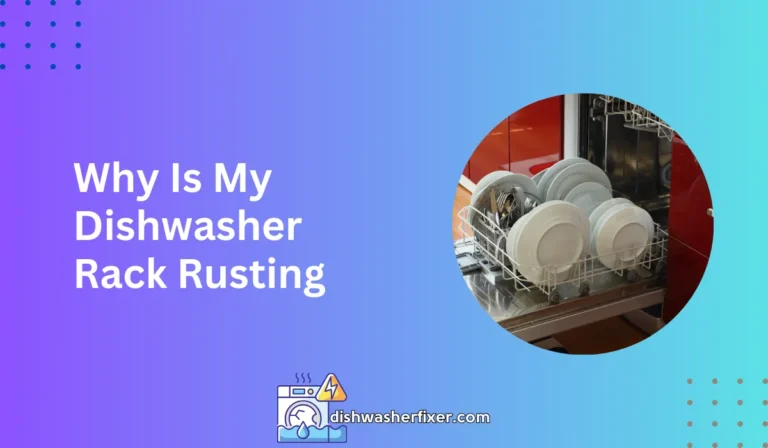How to Know if Dishwasher is Working: 5 Clear Signs
To determine if your dishwasher is working, check for signs like the machine completing cycles, dishes coming out clean, and hearing water sounds during operation. Additionally, ensure the dishwasher’s display panel shows no error codes and the appliance starts without issues.
Signs of a Properly Functioning Dishwasher

Cleanliness of Dishes
One of the most straightforward indicators your dishwasher is operating correctly is the state of the dishes after a wash cycle.
A well-functioning dishwasher will leave your dishes free of food residue, ensuring they are spotless and ready for immediate use.
You should not find any spots or streaks on glassware or flatware, which can often be a sign of hard water or detergent issues.
Moreover, dishes should come out dry and ready to use, thanks to the efficient drying phase that uses heat or a fan to remove moisture.
Sound and Vibration Patterns
Listening to your dishwasher can also provide clues to its health. A consistent hum or whir is the sound of a dishwasher that’s working as it should.
You’ll want to be mindful of any unusual noises, such as loud knocking or buzzing, which aren’t part of the regular cycle.
Additionally, the duration of a cycle should remain relatively constant. If you notice a significant increase in cycle time, it could be a sign of an underlying issue.
Indicator Lights and Control Panel
The control panel and indicator lights serve as the communication hub for your dishwasher. When all is well, status lights will show the progression of wash cycles and signal the end of a cleaning session.
If you encounter any error messages, consult your user manual to understand their meaning and the necessary action. A responsive control panel that reacts to your selections is also indicative of a well-functioning dishwasher.
Common Issues Indicating Dishwasher Problems

Inadequate Cleaning Performance
When dishes remain dirty after a cycle, it’s a clear sign something is amiss. If you’re finding food particles remaining or grease or soap residue, it could be a sign of clogged spray arms or a malfunctioning pump.
Water spots or film on glassware are often due to hard water or poor rinsing aid performance.
Unusual Noises and Vibrations
Sudden changes in noise, such as grinding or banging, can signal an obstruction or a failing motor.
If your dishwasher is excessively vibrating or moving, check to ensure it’s level and securely fastened in its space. Keep an ear out for changes in sound over time, which could suggest a need for maintenance or repair.
Error Signals and Malfunctioning Controls
Modern dishwashers often communicate problems through blinking lights or error codes. If you’re not sure what these mean, your user manual is an excellent first reference.
When buttons are not responding or the cycle is interrupted unexpectedly, it may indicate a malfunctioning control board, a common issue that requires professional attention.
Troubleshooting and Maintenance Tips

Regular Maintenance Procedures
Maintaining your dishwasher can prevent many common problems. Make sure to clean filters and spray arms regularly to prevent clogs.
Inspecting and cleaning seals and gaskets will ensure no leaks occur, and the door closes properly. Don’t forget to check and unclog the dishwasher drain if you notice water not draining after cycles.
DIY Troubleshooting Steps
If you’re experiencing dishwasher issues, a simple reset can sometimes do the trick. Look for simple fixes such as a blocked spray arm or overloading of dishes.
It’s essential to know when to clean your dishwasher yourself and when to call a professional.
Professional Assessment and Repair
Some dishwasher problems require a professional’s touch. If you’re not confident in your troubleshooting abilities, or if the issue is electrical or involves water leakage, it’s time to seek professional help.
Find a qualified technician who can diagnose and fix your dishwasher efficiently. When considering repairs, weigh the repair costs versus replacement, and don’t forget to factor in the age and efficiency of your current model.
Remember, regular maintenance can often prevent the need for repairs, and understanding your dishwasher’s functions will help you spot issues early.
Keep an ear out for sounds, an eye on the dishes, and stay familiar with your dishwasher’s normal operations. If you stay in tune with your appliance, you’ll ensure its longevity and optimal performance.
FAQs About Dishwasher Functionality
How can I tell if my dishwasher is completing its cycle properly?
You can tell if your dishwasher is completing its cycle properly if it shuts off automatically at the end of the cycle and the dishes come out clean.
What are the signs that my dishwasher is operating correctly?
Signs that your dishwasher is operating correctly include hearing water sounds during the cycle, clean dishes at the end of the cycle, and no error codes on the display panel.
How do I know if my dishwasher is starting without any issues?
Your dishwasher is starting without issues if it begins the cycle when you select the program and there are no error messages displayed.
What should I check for on my dishwasher’s display panel to ensure it’s working?
Check your dishwasher’s display panel for error codes or flashing lights, as their absence typically indicates the dishwasher is functioning properly.
Can the cleanliness of dishes indicate if my dishwasher is working well?
Yes, dishes that come out clean and free from residue are a good indication that your dishwasher is working well.
Final Thoughts
To ascertain whether your dishwasher is operational, observe if it completes cycles, cleans dishes effectively, and makes water noises during use.
A functioning display panel without error codes and the ability to start the machine promptly are also indicative of a dishwasher in good working condition.





